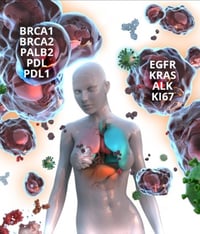Breast and Lung Cancer Research Tools

Invasive ductal carcinoma and invasive lobular carcinoma are the two major kinds of breast cancer. Early detection and intervention is the key to complete recovery which is now a possibility.
OriGene offers a range of tools for breast cancer research. Click on the gene symbols to find out about gene specific research tools.
Key breast cancer genes: BRCA1, BRCA2, CHEK2, ATM, PALB2, ER, PR, HER2, p53
Genes that convey moderate risk: BARD1, RAD51D, MSH6
Tools for breast cancer research: Proteins, Antibodies, Clones
Non-small cell lung cancer (NSCLC) and Small cell lung cancer (SCLC) are the two major types of lung cancers often attributed to smoking (primary or secondary), environmental and genetic defects. Low dose CT scan is one of the key diagnostic tools in lung cancer diagnosis. Pre-clinical studies have identified two key unmet needs in lung cancer diagnosis: identification of molecular biomarkers to determine the population of high risk current and previous smokers for low dose CT scan screeerning and identify patients with nodules that need a surgical biopsy.
OriGene offers a range of tools for lung cancer research including clones, antibodies, purified proteins and ready-to-use lentivirus kits. Click on the gene symbols to find out about gene specific research tools.
Key lung cancer genes and tools for gene specific research: TP53, KRAS, EGFR.
List of other genes involved in lung cancer:
| ALK | BRAF | CDKN2A | DDR2 | DLEC1 | EGFR | ERBB2 | IRF1 | KEAP1 |
| MAP2K1 | MAP3K8 | MET | NF1 | NRAS | NRG1 | PIK3CA | PPP2R1B | PRKN |
| RASSF1 | RB1 | RET | RIT1 | ROS1 | SLC22A18 | SMARCA4 | STK11 | PTEN |
What are UltraMAB antibodies?
One of the challenges in lung cancer is the cross reactivity among the antibodies. OriGene has developed UltraMAB antibodies with validated mono-specificity using high-density protein chip. Watch the video on UltraMAB antibodies.
Get a list of UltraMAB antibodies for lung cancer research!
Topics: Cancer research tools